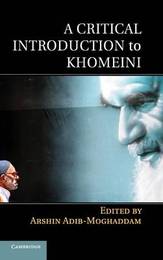
|
A Critical Introduction to Khomeini
Hardback
Main Details
| Title |
A Critical Introduction to Khomeini
|
| Authors and Contributors |
Edited by Arshin Adib-Moghaddam
|
| Physical Properties |
| Format:Hardback | | Pages:346 | | Dimensions(mm): Height 231,Width 155 |
|
| ISBN/Barcode |
9781107012677
|
| Classifications | Dewey:955.0542 |
|---|
| Audience | | Tertiary Education (US: College) | | Professional & Vocational | |
|---|
| Illustrations |
1 Maps; 20 Halftones, unspecified; 1 Line drawings, unspecified
|
|
Publishing Details |
| Publisher |
Cambridge University Press
|
| Imprint |
Cambridge University Press
|
| Publication Date |
17 February 2014 |
| Publication Country |
United Kingdom
|
Description
As the architect of the Iranian Revolution of 1979, Ayatollah Khomeini remains one of the most inspirational and enigmatic figures of the twentieth century. The revolution placed Iran at the forefront of Middle East politics and the Islamic revival. Twenty years after his death, Khomeini is revered as a spiritual and political figurehead in Iran and in large swathes of the Islamic world, while in the West he is remembered by many as a dictator and the instigator of Islamist confrontation. Arshin Adib-Moghaddam brings together distinguished and emerging scholars in this comprehensive volume, which covers all aspects of Khomeini's life and critically examines Khomeini the politician, the philosopher, and the spiritual leader, while considering his legacy in Iran and further afield in other parts of the Islamic world and the West. Written by scholars from varying disciplines, the book will prove invaluable to students and general readers interested in the life and times of Khomeini and the politics that he inspired.
Author Biography
Dr Arshin Adib-Moghaddam is a Reader in Comparative Politics and International Relations and Chair of the Centre for Iranian Studies at the University of London's School of Oriental and African Studies. Cambridge educated, he held the first Jarvis Doctorow Fellowship at the University of Oxford.
Reviews'This work is intended to provide advanced insight for students and researchers into the significance of Khomeini as a political innovator, religious leader, and historical figure in the establishment of the modern Islamic Republic of Iran. The essays cover topics such as Khomeini's role as a historical personality, his political philosophy and its application to the constitution and politics of Iran, his stance toward the West, and his attitudes toward issues of gender. Each contribution relates well to the theme, and the editor has done a remarkable job in integrating the work of various scholars. On the topic of Khomeini, this is one of the best works available. Summing up: highly recommended.' P. Rowe, Choice
|